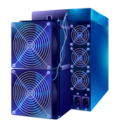Asic Miner Profitability
Our mining profitability calculator helps users quickly pinpoint the most lucrative mining options by delivering real-time data in multiple fiat and cryptocurrency currencies, including USD, EUR, GBP, AED, CAD, AUD, THB, ETH, and BTC. It allows precise electricity cost inputs up to three decimal places for highly accurate profit estimations. Users can access a clear overview of top-performing miners, algorithm-specific performance tables, and visually organized listings of mineable coins with recognizable cryptocurrency icons, simplifying decisions for maximum returns.
| Model | Hashrate |
Profitability
Profit
|
|---|---|---|
|
Bitmain Antminer Z15 Pro
840kSol/s
|
840 kSol/s |
$22.88/day
|
|
Bitmain Antminer Z15
420kSol/s
|
420 kSol/s |
$11.00/day
|
|
Bitmain Antminer Z11
135kSol/s
|
135 kSol/s |
$1.74/day
|
|
Innosilicon A9++
140kSol/s
|
140 kSol/s |
$1.66/day
|
|
Innosilicon A9+
120kSol/s
|
120 kSol/s |
$0.99/day
|
|
Innosilicon A9
50kSol/s
|
50 kSol/s |
$0.46/day
|
|
Bitmain Antminer Z9 Mini
10kSol/s
|
10 kSol/s |
$-0.25/day
|
|
Bitmain Antminer Z9
42kSol/s
|
42 kSol/s |
$-0.47/day
|
Our cutting-edge mining calculator offers comprehensive insights across all major cryptocurrency algorithms, helping users easily identify the most profitable options for their specific hardware. The algorithm data is continuously refreshed to keep pace with the dynamic crypto mining industry, providing accurate evaluations based on real-time profitability statistics and overall market activity. This empowers users to make well-informed choices that reflect the latest mining conditions and algorithm performance.
Bitcoin Mining Difficulty
Monitor the latest Bitcoin network difficulty metrics in real time, including block times & estimated time until the next difficulty adjustment.
Progress
Current progress:
37.80 %
Remaining Block
Blocks Left:
1254
Remaining Time
Time Left:
~ 8 days 16 hours
Next Change
Upcoming change:
0.6 %
Block Time
Current Block Time:
10.0 minutes
What is Equihash algorithm?
Why Should You Rely on Our Profit Calculator for Accurate Mining Insights?
Equihash is a memory-hard proof of work introduced in 2016 by Alex Biryukov and Dmitry Khovratovich, and it draws on the generalized birthday problem through Wagner’s algorithm. The design forces miners to juggle large tables of partial collisions, so RAM capacity and bandwidth dominate performance. This favors GPUs with ample VRAM and wide buses, and it slows the early rise of specialized ASICs. Privacy-focused projects like Zcash, Horizen, and Komodo adopted it to broaden participation and to anchor censorship-resistant payments. Networks select parameter pairs such as 200_9, 192_7, and 210_9 to balance memory footprint, solver time, and verification cost. Full nodes verify proofs much faster than miners can find them, which preserves accessible validation on ordinary machines. ASICs have still emerged for some variants, so absolute resistance is difficult and decentralization remains a moving target. Solver engineering pushes hard on memory behavior with bucket sorting, parallel collision search, warp-level shuffles, and cache-friendly data layouts. Custom allocators and coalesced writes trim latency for intermediate states, and these gains compound on GPUs with high memory clocks. Practical tuning favors more VRAM, higher memory frequency, and stable thermals over raw core speed, and miners track throughput as solutions per second. Performance scales more with memory bandwidth than with arithmetic units, and that trait defines the economic edge for many rigs. The algorithm can require hundreds of megabytes to several gigabytes per instance depending on parameters, which can exclude low-end systems. Personalization fields bind solutions to a specific chain, so work cannot be recycled across networks. Difficulty retargeting and parameter choices aim to hold block times steady as hashpower shifts and they shape who can persist in the contest. Miners estimate returns with public profitability tools and weigh power draw against efficiency to judge viability, because in this arena where machines live or die by heat and watts, fear turns to prudence and fairness hardens into rule.
Latest ASIC Miners
Check out the latest ASIC miners added to our site. These are the newest listings, featuring the most recent models.
Matches Inibox R1X XMR Edition
Pinecone
LTC-DOGE Hashcard
JingleMiner
Antminer X9
Bitmain
Why ASIC Mining?
The Advantages of ASIC Mining Compared to Other Mining Types
ASIC (Application-Specific Integrated Circuit) mining involves specialized hardware designed exclusively for mining cryptocurrencies like Bitcoin, offering unmatched efficiency and performance. Unlike general-purpose GPUs, ASICs are optimized for specific algorithms, delivering significantly higher hashrates while consuming less power per hash. This makes them far superior for mining tasks, as they maximize profitability by reducing electricity costs and increasing mining output. ASIC miners are purpose-built, providing stability and reliability in high-demand mining environments, unlike GPUs which are prone to overheating and wear during prolonged use. Their compact design also allows for easier scalability in large mining operations. By focusing solely on mining, ASICs eliminate the overhead of multi-purpose computing, resulting in faster block-solving times. This efficiency translates to higher rewards, making ASICs the preferred choice for serious miners aiming to stay competitive in the cryptocurrency market. In contrast, GPU mining, while versatile, cannot match the raw power and cost-effectiveness of ASICs for dedicated mining tasks.
Optimized for Mining
Energy Efficient
Reliable & Stable
Scalable
More about the Equihash algorithm
See how our profit calculator delivers accurate, real-time mining insights, helping miners make informed decisions.
Equihash, introduced in 2016 by cryptographers Alex Biryukov and Dmitry Khovratovich and grounded in the generalized birthday problem, defines its proof-of-work by a pair of adjustable parameters (n, k) that force miners to execute a sequence of collision-finding steps while retaining large sets of intermediate data in memory, so throughput hinges on RAM capacity, bandwidth, and cache locality rather than on raw arithmetic alone; this deliberate memory-hardness raises the cost of specialization, historically favoring well-equipped GPUs and general-purpose hardware, and it anchors verification in a compact, deterministic proof that nodes can check quickly using the same hash primitives (commonly BLAKE2b in deployed systems) without mirroring the miner’s heavy memory footprint, which helps keep block validation efficient even as the search itself remains data-hungry; networks have tuned (n, k) over time-moving between parameter sets such as those used by Zcash and its later iterations-to sustain decentralization pressure and blunt hardware monocultures, and researchers have explored hybrid consensus designs that embed Equihash as a PoW layer to complement proof-of-stake, thereby adding a tamper-resistant, memory-bound gate to block creation; in practice, the algorithm’s demand for hundreds of megabytes to several gigabytes of working memory per solver round transforms mining into an exercise in moving and organizing data at scale, and while this curbs trivial ASIC advantages, the eventual appearance of dedicated Equihash ASICs has underscored a broader reality: complete ASIC resistance is elusive, and parameter agility plus governance must do the ongoing work of defense; still, by translating cryptographic theory into a puzzle where collisions, not just cycles, carry the rhythm of difficulty, Equihash has remained a reference point for memory-hard proof-of-work, powering privacy-focused networks such as Zcash, Horizen, and Komodo, encouraging wider participation where high-memory rigs are accessible, yet candid about the trade-off that steep memory requirements can pose for smaller miners, and standing as a sobering, durable benchmark in the continuing negotiation between open participation and hardware centralization.
 English
English
 German
German
 Hungarian
Hungarian
 Dutch
Dutch
 Spanish
Spanish
 French
French
 Italian
Italian
 Czech
Czech
 Polish
Polish
 Greek
Greek





















